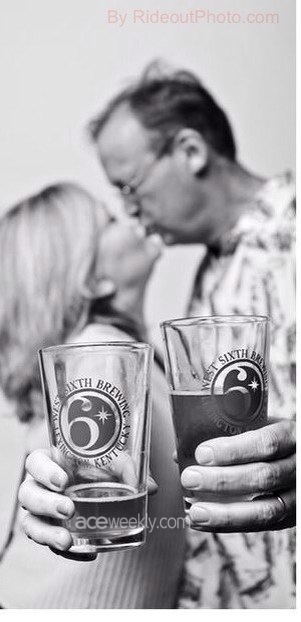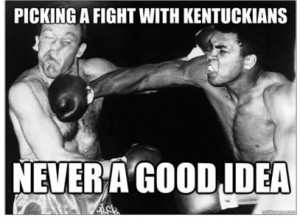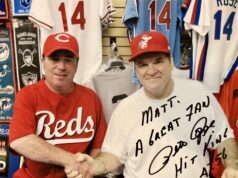
I was onstage at Lexington Center telling 50 CIOs at the Alltech Symposium that the watershed social media moment was Barack Obama’s first inauguration, that they had to be able to marshall the 7-minute drill from smartphone to CEO to social media post or they were lost, when the Hat hit the fan.
Quietly posted to Facebook, one of millions of small business FB posts thrown up every day, came a message from West Sixth Brewing Co.
I don’t follow West Sixth Brewing, I saw it shared by my dogcare — just after “Regular Monday Dogs: No Dogcare on Memorial Day!”
Dogcare rarely posts anything not related to dogs. So I clicked. On a textbook example of what I was telling the CIOs.
And from about 12:30 p.m. Tuesday to 12:30 a.m. Wednesday, I watched it unfold, on two brand Facebook pages, on scores of my Facebook friends’ feeds, in these friends’ Facebook profile photos, on Twitter, in memes, in the local business press, in the craft beer press, in the mainstream newspaper and later, in lawyers’ letters posted on Scribd. By the end of the night, there was a newly created Facebook page called “I Stand With West 6th Brewing.”
I read more than 200 posts on the West Sixth facebook brand page and about 700 on the Magic Hat facebook brand page. Two very popular Lexington eateries announced that they would not serve any Magic Hat products until the lawsuit was dropped. The “boycott” word was thrown. It took Magic Hat more than 10 hours to respond to the social media onslaught. The “smear campaign” was alleged.
The facts are complex and the sidebars more interesting. It’s a pitched legal battle over fonts, dingbats and marks. As there is beer involved, it is a “passion topic.” And it’s in federal court.
(Keep your eye on David in this story, he’s got an interesting rock in that slingshot.)
So how did this snowball from one Facebook post? The startup brewery located, fittingly, on West 6th Street in Lexington, sent a carefully worded request for people to sign a petition asking the Magic Hat brewing company to drop its federal lawsuit alleging trademark/logo infringement.
In essence, the year-old West 6th’s use of a 6 and a compass star dingbat in it is too close to the #9 mark that is trademarked by Magic Hat. Magic Hat, after a series of lawyer communications toward settlement of the issue through revisions suggested by West 6th, filed a federal lawsuit alleging trademark infringement. A 6, after all, is just an inverted 9, the lawsuit pointed out. It is confusing customers and distributors, they say.
Magic Hat, founded in the 1990s in Vermont as one of the class “craft breweries,” makes its #9 beer, which is apricot-tinged and the centerpiece of a whimsical brand line. The company was sold in the mid 2000’s and is now part of a $360+ million brewing concern that includes Labatt’s, Genesee, Honey Brown and Pyramid. It is owned by a holding company in Costa Rica, purchased about the time that the entrepreneurs who started West 6th Brewing were putting the finishing touches on the small local brewery and community hub nestled in an economically depressed neighborhood on the North Side of Lexington.
The federal lawsuit demands a jury trial and requests, in addition to a cease and desist of use of the objectionable logo, all profits that the brewery, which distributes an IPA and an amber ale in select locations in Kentucky and border states, has made since beginning the logo’s use. (Since it opened, in other words).

From craft beer corners, who is a “real” craft brewer — the guys in the old bread factory on West 6th or the people brewing in Costa Rica? From other craft beer specialists, it was a your beer sucks versus your beer sucks debate. That is the moral high ground, but it won’t have any bearing in court. From people all over the country, a disappointment with a big brand beating up on the small guy it used to be. Nearly all the 200 posters on West Sixth’s FB page said they would not buy Magic Hat until the lawsuit was dropped. About half of the 745 commenters on Magic Hat’s page said the same.
Magic Hat is a strong brand, early to high regard in craft beer and with a very sweet graphic persona. (Full disclosure: I love Vermont. I love Magic Hat’s whimsical graphics. I have never had either beer and I never will.) Its supporters, learning late at night of the issue that had roiled Kentuckians and their social networks all day, came to the defense of the Hat.
There were some sage voices on FB and on local Lexington media who said that while they sympathized with West Sixth and liked the brewery’s community involvement, they did see infringement. These people, in general, provided point by point analysis of the two logos and uses, with reference to intellectual property law.
Many people were incensed over the line in the lawsuit that said that a 6 is simply an inverted 9. Others pointed out that Magic Hat’s Hibiscus/Cucumber line has a logo that is very similar to Mountain Dew’s mark, with convenient images for comparison. Another put Van Gogh’s “Starry Night” next to the logo of a Magic Hat product that was similar. The movie poster for “Big Fish” bears a resemblance to another Magic Hat brand logo, the same person pointed out. Will the Count and Big Bird be next, some asked? Trademark all the numbers!
Regionalism came into it. Northeast versus Kentucky, though I will say for the fervor, the Northeasterners in this debate did not step down into the Hixploitation stereotypes of the Commonwealth, and for that they should be commended. (Full disclosure: raised in Northeast, claiming Kentucky for 20+ years, if she will have me.) Meme: Picking a fight with a Kentuckian, never a good idea. (Image: Muhammad Ali delivering a knockout).
When Magic Hat did respond, on its FB brand page, (approximately 9 hours and 53 minutes late for the 7-minute drill) it used a reasoned headline, asking people to look at the other side. It posted 8 pages of attorney correspondence to Scribd, so people could read the allegations and the attempts to settle. These were forwarded by West 6th supporters on my FB feed. Magic Hat also used the term “smear campaign,” which is a mischaracterization and a misunderstanding of social media.

West Sixth Brewing was co-founded by Ben Self, an MIT graduate and a founding partner of Blue State Digital, the group that developed and executed the social media and digital strategy for a little-known U.S. senator from Illinois in his first presidential campaign — it was a strategy that listened to trends of what groups of people were hoping for from their government and reached them one at a time. Since returning to Kentucky, he and his family have built businesses, organized two Now What Lexington conferences after the Creative Cities Summit here, supported SeedLeaf and created FoodChain, and created the collective called The Bread Box. They have hosted events that have revitalized the community around the brewery.
When I first saw that 6 on the can, I thought, oh here’s a logo/brand mistake. But not of the trademark violation type. It was the name your beer after the second-worst street in the city type. What were they going to name it? Broken Down Old Bread Factory Near That Drug Corner Ale? West Sixth Brewery has become, within a year, one of the most thriving locations in Lexington. This past Saturday, they hosted the wrap-up to Craft Beer Week with their second annual Think Local, Drink Local event. The social media support you see for this business and product is no smear campaign. It is the same type of organic support, meticulously recruited one social user at a time, entering a larger group, that led to the social media watershed moment: Barack Obama’s first inauguration.
In pondering the graphic design problems facing West Sixth, I’m reminded of the famous story from Northern Kentucky. When malls were big, the very biggest, fanciest was built in the city of Florence. And it was called Florence Mall. The city painted FLORENCE MALL on its water tower next to Interstate 75 to proudly mark this attraction. It was pointed out to the city council that this constituted illegal use of city property for purposes of advertising a commercial venture. Incensed, the mayor sent the painters up to change it to what it still says today: FLORENCE Y’ALL.
We will think of something.
Kakie Urch is an asst. professor of multimedia in the School of Journalism and Telecommunications at University of Kentucky, where she teaches courses on social media, Web publishing and branding.
[nggallery id=10 template=title]






